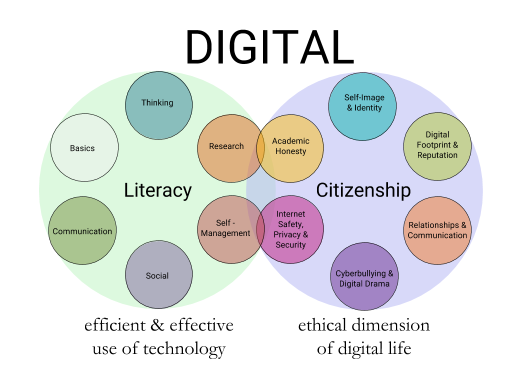Hi everybody! White & Le Cornu presentations make me enter a new world. What is to be a visitor or a resident? I decided to google a bit more about “digital literacy” and I found this very interesting article. You can read more following the link below , but here is what I extracted from the article and my reflections about this “digital distinctions”. https://www.21c-learning.com/digital-distinctions/
“Digital distinctions”; the concepts of digital citizenship and digital literacy (by Paul Swanson)
Here Paul Swanson discussed the origin of the digital distinctions and how nowadays digital citizenship and digital literacy are intertwined.
Digital Citizenship
The digital kids: “We give them all these machines and assume that they can pick them up and use them. How much time do we spend teaching them to use their computers?”
“IF ONLY WE HAD A STRONGER CITIZENSHIP CURRICULUM AT OUR SCHOOL ALL OF OUR STUDENTS’ REAL WORLD PROBLEMS WOULD GO AWAY.”
Interestingly, if we think about the origin of the word citizenship, it comes from the Latin civitas, derived from civis (citizen). It was defined by Cicero as “concilium coetusque hominum jure sociati”: the social body of citizens united by law (Smith, 1859).
In modern times, we talk about citizenship as the rights and responsibilities that we have as part of a group. In democracies, this often means becoming involved with the political process and being an informed voter, obeying the laws, and treating the community with respect.
In a digital context, however, citizenship takes on a somewhat different meaning. Just as citizenship deals with the relationships between citizens, digital citizenship focuses on technologies that connect us with one another, i.e. the internet. However, there is no uniformity in law related to the internet; all we have are conflicting laws from different countries and individual agreements created by websites and organizations. Due to the decentralized nature of the internet, rights and responsibilities are often negotiated autonomously by individuals.
DIGITAL CITIZENSHIP IS BEST UNDERSTOOD AS THE ETHICAL DIMENSION OF DIGITAL LIFE.
It is about our rights and responsibilities as we go online; not because of legal requirements or political duties but arising from an individual and collective sense of ethical rights and responsibilities to one another.
Digital Literacy
In contrast, the term digital literacy usually refers to types of skills. The word literate comes from the Latin literatus and refers to someone who knows the letters; that is, someone who has a fluency in reading and writing. Digital literacy refers to an individual’s ability to find, evaluate, and compose clear information through writing and other mediums on various digital platforms. However, in the past century literacy has grown as a concept to include media literacy, information literacy, and more.
In this reflection, Paul Swanson has developed the visual below to show the relationship between digital literacy and citizenship. I think this is very interesting, and I find myself in this representation. Where can we draw the line between “self-image/identity, Privacy and honesty” and “the digital literacy world where we can access data from all over the world”? Is it two worlds that are separated or intimately connected? What do I want?

By the way, I performed the “self assessment survey and I got 60 pts, which means that I am an “expert”. I consider myself as an expert in my professional life since I have interest in new tools to improve our communication and/or presentation of research. But I am really an explorer in terms of “private life”. These are two worlds (professional vs private) that I do not want to intertwine. Is it still possible?!!!